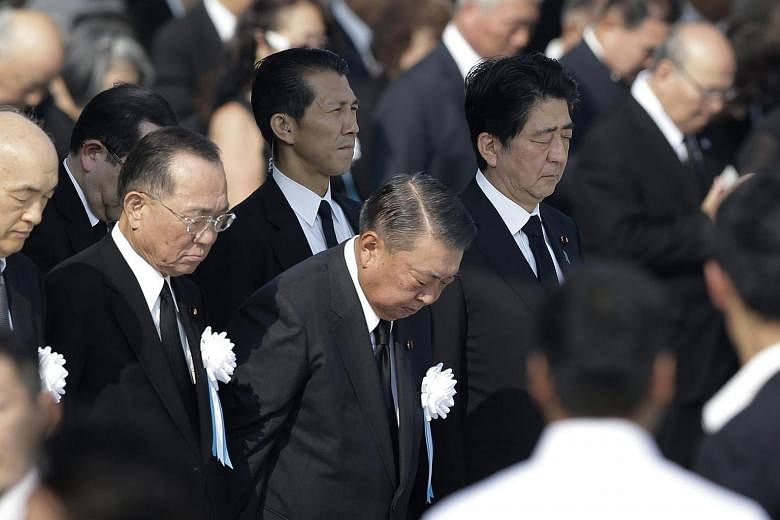TOKYO (REUTERS) - Advisers to Prime Minister Shinzo Abe agreed in a report issued on Thursday that Japan caused much damage in Asia through a "reckless war" but quibbled over the term "aggression" to describe its actions.
Their report, meant to serve as reference for Abe's statement marking the 70th anniversary of the end of World War Two, covered over 100 years of history in 38 pages.
It referred to Japan's aggression in China after 1931 but noted that some advisers objected to the term because of a lack of a definition in international law and a reluctance to single out Japan when other nations had engaged in similar acts.
Abe repeated on Thursday, the 70th anniversary of the atomic bombing of Hiroshima, that he upholds previous statements on the war, which include a 1995 "heartfelt apology" by then-premier Tomiichi Murayama.
But he has also questioned use of the term aggression - a key phrase in the Murayama statement - and his stated desire to issue forward-looking comments in his own words has raised concerns that he wants to dilute past apologies.
That would spark anger in China and South Korea, which both suffered under Japanese rule, with parts of China occupied in the 1930s and Korea colonised from 1910 to 1945. It could also disappoint ally the United States.
"After the Manchurian Incident (in 1931) Japan expanded its aggression against the continent, deviated from the post-World War One shift toward self-determination, outlawry of war, democratisation, and an emphasis on economic development ... and caused much harm to various countries, largely in Asia, through a reckless war," the advisers said, referring to the trigger for Japan's conquest of then-Manchuria in northeast China.
"In China, in particular, this created many victims across wide areas." Still, the advisers said, in the second half of the 20th century, "based on the deep remorse over the war, Japan has been reborn as a country that is completely different".
They criticised South Korean President Park Geun-hye for what they termed a harsh and emotional attitude towards Japan.
Ties with South Korea have been strained by a territorial dispute and a feud over Korean "comfort women" forced to work in Japan's wartime military brothels.
The report had warmer words for Chinese President Xi Jinping, whom Abe has met twice since last November in an incipient thaw in strained ties.
"While the history issue remains a major concern in the present Japan-China relations, incumbent President Xi Jinping has clearly committed himself to the continuation of mutually beneficial relationship based on common strategic interests."

